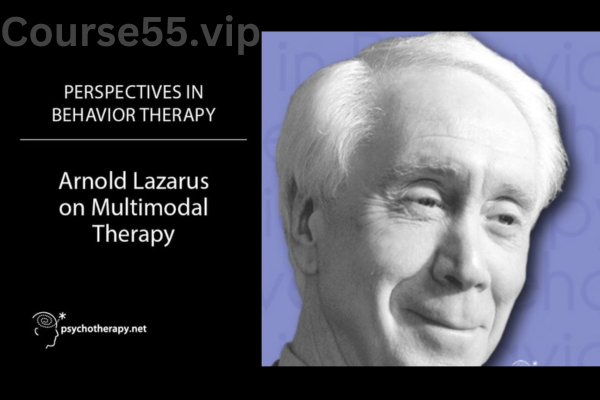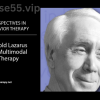Arnold Lazarus on Multimodal Therapy With Arnold Lazarus
$29.00 Original price was: $29.00.$7.70Current price is: $7.70.
Review of Arnold Lazarus on Multimodal Therapy – Digital Download!

Arnold Lazarus on Multimodal Therapy With Arnold Lazarus
Overview

Exploring Arnold Lazarus’ Multimodal Therapy: A Revolutionary Approach
Multimodal therapy (MMT) stands as a powerful evolution in psychotherapy, spearheaded by the groundbreaking contributions of Arnold Lazarus. Acknowledged as the founding architect of this method, Lazarus compared psychological challenges to a richly woven tapestry made from the diverse strands of human experience. By the 1980s, he had artfully merged multiple psychological schools into a unified model, designed to tackle the complex realities of mental health. This article delves into the core principles of MMT, its major components, its role in shaping modern therapy, and the enduring influence of Lazarus’s visionary work.
Decoding the Core of Multimodal Therapy
Central to MMT is the acronym BASIC I.D., representing the fundamental dimensions of human functioning: Behavior, Affect (emotion), Sensation, Imagery, Cognition, Interpersonal Relationships, and Drugs/Biological Factors. Lazarus designed this model to reflect the necessity of viewing clients holistically, positing that psychological struggles often stem from the intricate interplay among these different domains.
-
Behavior: Observable actions and habitual patterns that provide insight into distress signals.
-
Affect (Emotion): Emotional responses that significantly shape how behaviors and thoughts emerge in various settings.
-
Sensation: Physical sensations that can deeply impact emotional states and mental clarity.
-
Imagery: The internal visualizations and symbolic images that influence emotions and cognition.
-
Cognition: Thought processes and belief systems that critically affect feelings and behaviors.
-
Interpersonal Relationships: The network of social interactions and relationships, fundamental to psychological wellness.
-
Drugs/Biological Factors: Biological influences, including medication effects and genetic predispositions, offering a broader lens on mental health.
Lazarus’s integrative framework functions much like a symphony conductor, orchestrating these elements into a harmonious narrative that captures the complexity of human psychology.
Flexibility and Personalization: The Heart of MMT
Unlike traditional therapeutic models that often fit clients into preset theories, multimodal therapy thrives on its flexibility and client-specific tailoring. Lazarus pioneered an adaptable framework, likened to a bespoke suit, where every element is meticulously customized to suit the individual’s needs—moving away from rigid, generalized approaches.
Therapists using MMT draw techniques from diverse disciplines—whether employing behavioral methods to modify habits or cognitive strategies to alter distorted thinking. Research by Rosen et al. (2020) indicated that clients who engaged in MMT reported higher levels of satisfaction and success compared to those treated through single-modality approaches.
Furthermore, MMT’s holistic orientation harmonizes with the increasingly popular biopsychosocial model, recognizing that mental health results from intertwined biological, psychological, and social factors—a perspective that is particularly vital when managing complex, comorbid cases.
Applying Multimodal Therapy in Clinical Practice
The versatility of MMT translates effectively into diverse therapeutic contexts, empowering clients by affirming their multifaceted nature. Lazarus’s methods find relevance in individual counseling, group therapy, and beyond.
Some practical implementations of MMT include:
-
Cognitive-behavioral methods: Restructuring negative thinking patterns while cultivating healthier coping mechanisms.
-
Behavioral techniques: Using reinforcement and behavior modification to encourage positive behavioral changes.
-
Social skills development: Enhancing interpersonal effectiveness through skills training and role-playing exercises.
-
Mindfulness and sensory focus exercises: Promoting bodily awareness to support emotional regulation and mental clarity.
Through these diverse applications, therapists are equipped with a vast array of tools, selecting interventions most suited to the unique needs of each client—ensuring therapy remains both effective and compassionate.
Arnold Lazarus’ Enduring Contributions to Psychotherapy
Arnold Lazarus leaves behind a profound legacy, not merely as an innovator but as a dedicated practitioner and prolific writer. His influential books, articles, and workshops have inspired generations of therapists to embrace a more nuanced and integrated approach to psychological treatment. His seminal work, Multimodal Therapy, remains a cornerstone in psychotherapy education.
Beyond academic accolades, Lazarus’s commitment to refining therapeutic practice earned him numerous honors, including the Distinguished Professional Contribution Award from the New Jersey Psychological Association.
At the heart of Lazarus’s legacy is the belief that therapy should transcend formulaic interventions; it should be an empathetic, detailed, and deeply human process. This philosophy fosters richer therapist-client relationships, nurturing healing spaces where deeper psychological work can flourish.
Final Reflections on Multimodal Therapy’s Lasting Influence
In the vast landscape of psychotherapy, Arnold Lazarus’s multimodal therapy emerges as a vivid and enduring thread—interweaving the many aspects of human existence into a cohesive therapeutic approach. His emphasis on appreciating each client’s unique psychological makeup reshaped the field, steering therapists toward more personalized, empathetic practices.
Today’s clinicians, empowered by Lazarus’s insights, can look beyond conventional frameworks, embracing a holistic, client-centered philosophy. His contributions will continue to reverberate within psychotherapy, inspiring both therapists and clients to honor the rich, intricate narratives that define each human life.
Frequently Asked Questions:
Business Model Innovation: We operate a group buying strategy, allowing participants to share costs and access popular courses at reduced prices. This model benefits individuals with limited financial resources, despite concerns from content creators about distribution methods.
Legal Considerations: The legality of our operations involves complex issues. Although we don’t have explicit permission from course creators to resell their content, there are no specific resale restrictions stated at the time of purchase. This ambiguity creates an opportunity for us to provide affordable educational resources.
Quality Control: We ensure that all course materials purchased are identical to those offered directly by the creators. However, it’s important to understand that we are not official providers. As such, our offerings do not include:
– Live coaching calls or sessions with the course author.
– Access to exclusive author-controlled groups or portals.
– Membership in private forums.
– Direct email support from the author or their team.
We aim to reduce the cost barrier in education by offering these courses independently, without the premium services available through official channels. We appreciate your understanding of our unique approach.
Be the first to review “Arnold Lazarus on Multimodal Therapy With Arnold Lazarus” Cancel reply
You must be logged in to post a review.

 Intermediate To Advanced Breath-Control Course By Simon Borg-Olivier
Intermediate To Advanced Breath-Control Course By Simon Borg-Olivier  What to Do in the First 90 Days of Your New Job
What to Do in the First 90 Days of Your New Job 















Reviews
There are no reviews yet.